
Related Content

Inspiring golfers to pursue this great game with drive and passion
Keywords
Related Posts
.png)
WAGR Files: Cracking the WAGR Power Rankings for Pro Events
Decoding the Black Box on WAGR Power Rating for Pro Events

Blades Brown: Generational Talent?
A lot more in common with Akshay Bhatia than just sharing agents

Move Over FedEx Cup Points: it’s UPS (Universal Points System) Time
Introducing the "Just Play Better" PGA Tour
Earlier this month, Adam Schupak reported that recent PGA Tour champion and resident tour genius Maverick McNealy did a deep dive analysis on FedEx Cup points assignment for different types of tour events (regular, Signature, Opposite-field and majors). His main finding was that Signature events were getting outsized points relative to their performance, using DataGolf's True Strokes Gained as a performance metric. One example mentioned was Corey Connors getting nearly the same points for finishing 6th in the Canadian Open, a full-field event, as he did for finishing 20th the following week against 72 golfers at the Memorial. According to DataGolf, his performance at RBC was over a stroke better per round after adjusting for the course and strength of field, but got the same number of points.
McNealy's findings seem to have some traction with the tour, and a points revision is up for vote by the Board soon. If adopted, it could level the playing field between the "PG-A" and "PG-B" tours that seem to exist under the current signature/elevated/designated event framework.
While we haven't seen Mav's proposal, we took a deep dive into the 2024 PGA Tour season results on DataGolf to see if we'd reach the same conclusion. Spoiler alert: great minds think alike!
First, we looked at all of the True Strokes Gained distribution by percentile across the various tournament types (note: The Players Championship is grouped with Majors as they all currently get 750 points for the winner):
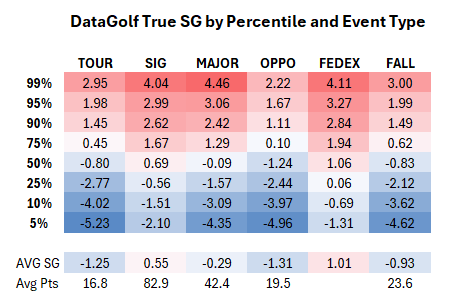
It's no surprise that the Signature Events, Majors and FedEx Cup playoff events are more heavily distributed towards stronger performances -- these are the primary events for the game's top players. But does this justify the Signature events getting 1.5-2.7x points for a given finish position? Let's take a look at the average TrueSG by finish position:
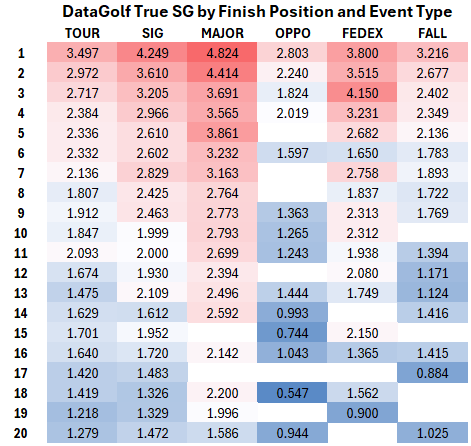
Here is where it starts to get interesting. First, you'll notice that the Majors/Players are on a different plane than the signature events. It's about as tough to get a Top 15 in a major as it is to get a Top 9 in a Signature event. Majors do get 50 more points for a win, but otherwise have the same points assignment by finish position as Signature Events. You can make a very strong case that Majors should get a higher point assignment.
And while top finishes in Signature Events are more impressive than their Regular-event counterparts, once you get down to about 20th and below, regular event and tour event performances start to look more and more similar. However, a 20th place finish is worth 100 points in Signature events and 45 points for regular tour events.
Next, we grouped each True SG performance into .25 bins, collapsing all performances at a max or min of +4/-4 per round. If the FedExCup points distribution were equitable, the points earned should be more or less the same across event type.
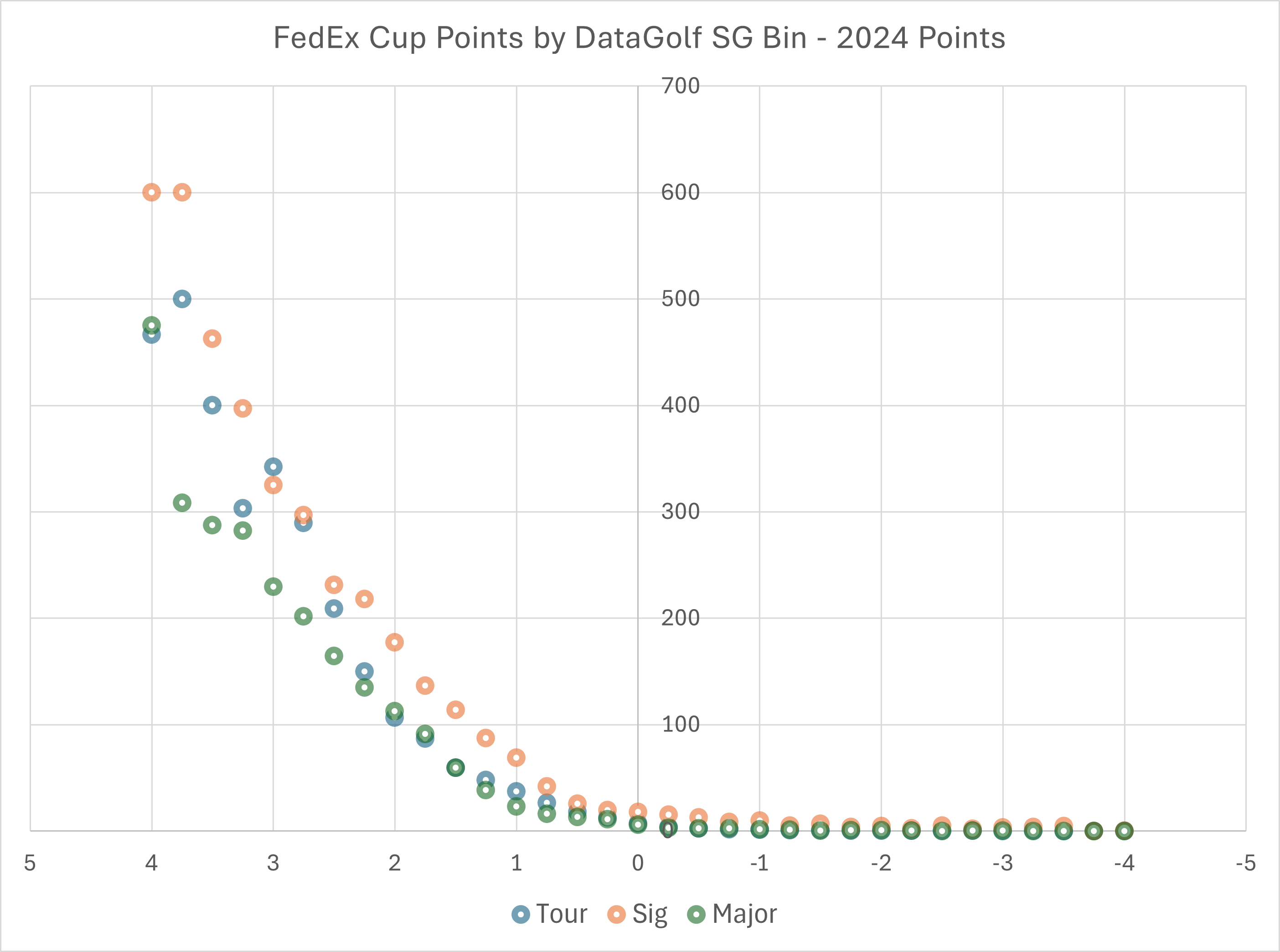
This is likely the same smoking gun that McNealy discovered. Signature Events are simply getting outsized points relative to both regular events and majors for a given Strokes Gained performance. Obviously it's difficult to reach Signature Event status, but it appears the system is in place to help keep you there once you make it. Closed shop, anyone?
Mav, if you're out there, we'd love to compare notes. With an eye towards aligning the points allocation more equitably across event types, here is our proposal for the points assignment, if you use the 500-point regular tour event distribution sacrosanct as the starting point:
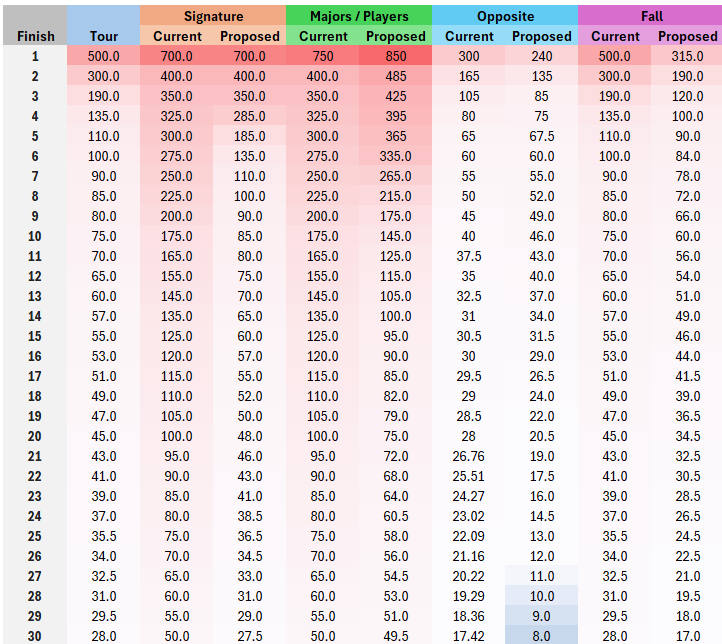
Signature Events are still worth 700 points to the winner under the proposal, but finishes from 4th place and below are reduced and eventually get to a point where they are the same or even slightly below the corresponding Regular Tour event finishes. This is in recognition that finishing 30th out of 156 (or 144) players in a full-field event is about the same as finishing 30th in a 70-80 player no-cut event. There is no justification for the Signature event player to get close to 2x the points for this type of finish.
Top major finishes are recognized more heavily -- with 100 additional points going to the winner and higher points through 7th place. The points are higher for every finish position relative to regular events, but not as generous in the 10th-25th range relative to the current points system.
Opposite field events earn slightly less than before, with 240 points going to the winner vs. 300 currently. And while the current FedEx Fall operates as sort of an addendum to the regular PGA Tour season, its 500-point assignment seems overly generous when compared to regular tour events during the summer.
So what do the average point assignment curves look like under this proposed model? Compared to the chart above, they are much more closely aligned:
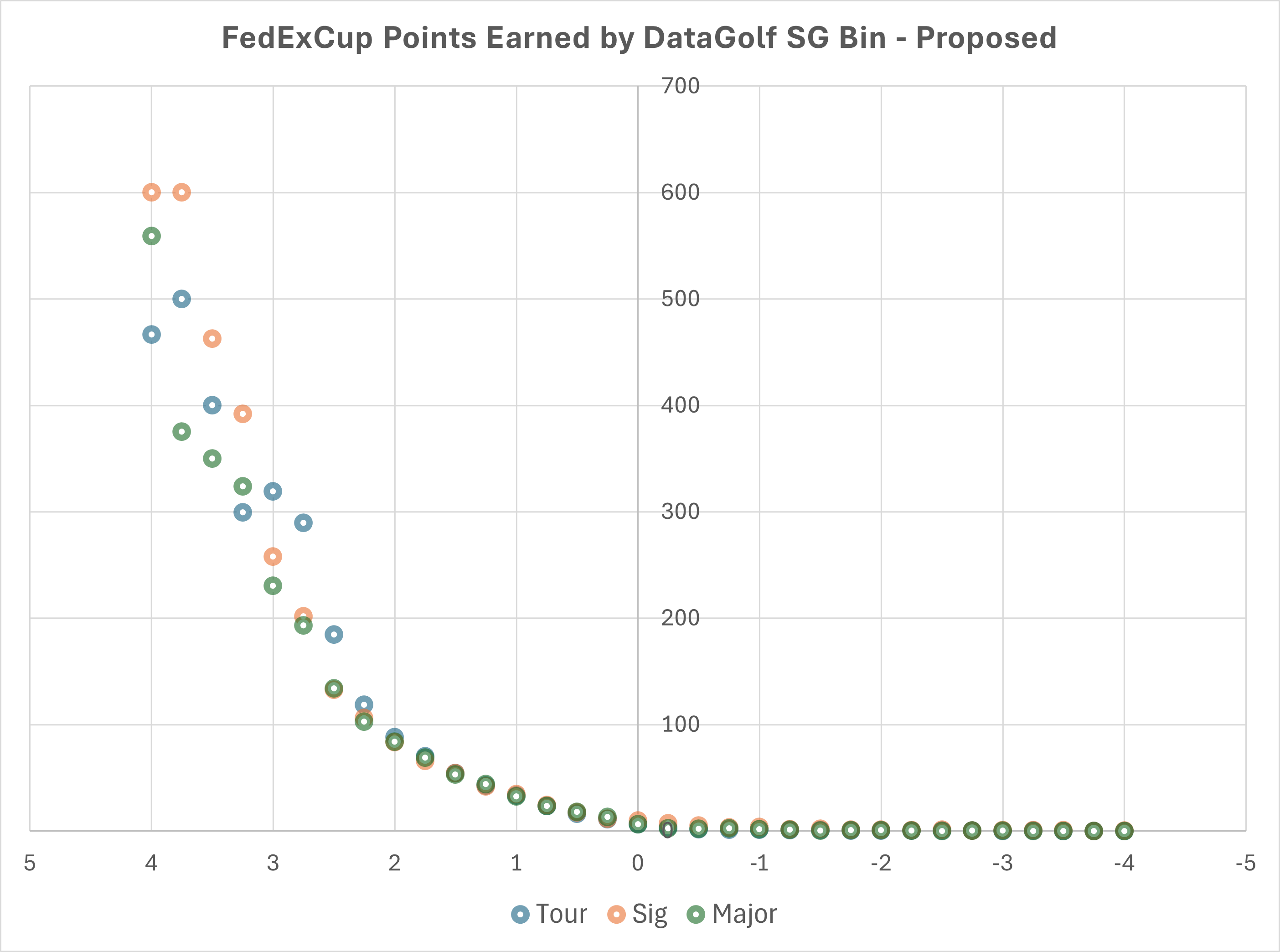
Obviously there are going to be winners and losers with these proposed changes, mostly in favor of solid performers in regular events and majors and against mediocre performers in Signature events. Here are the biggest movers up and down from a FedExCup rank perspective with the proposed changes.
Biggest Gain
Jake Knapp: 64 to 40 (would be in 2025 Signature Events)
Justin Rose: 62 to 38 (would be in 2025 Signature Events)
Davis Riley: 90 to 76
Thomas Detry: 42 to 29 (may have made Tour Championship)
Min Woo Lee: 65 to 52 (would be in Aon Next 10)
Biggest Drop
Sepp Straka: 26 to 56 (would've been outside Tour Championship)
Hayden Springer: 127 to 141
Eric Cole: 50 to 72 (would be outside 2025 Signature Events)
Jason Day: 33 to 54 (woul've been outside Tour Championship)
Seamus Power: 56 to 74 (would be outside Aon Next 10)
[Note: I did not make any changes to the FedExCup playoff points assignment, which are probably fine for purposes of the playoff but at 4x the regular event are way outsized when they are used as-is for the FedExCup fall race. This really benefits the Top 70 guys who get to St. Jude but don't make the top 50 for the BMW Championship.]
Lining up the points assignments by performance is not only the equitable thing to do, but it also sets up the opportunity for other changes which could revolutionize the PGA Tour operating model across its assets. Mav, I'm ready to pick your big brain anytime.
Free E-mail Newsletter
Subscribe to the DRVN.Golf Newsletter
DRVN.Golf in your inbox, every month